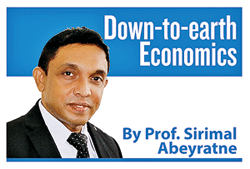Economic battle at hand
View(s):As you understand, I had to prepare this column before the elections, which was scheduled for Saturday the 21st of September, not knowing who would win the elections. Whoever that is, while congratulating the newly elected President of Sri Lanka, I recalled my podcast interview on the economic battle that he must win within the next couple of years.

Tourism is a great growth story for Sri Lanka.
Increased vulnerability
By extracting from the podcast interview, today I would like to focus on this economic battle – the main challenge that the new President must face. It is not about “how to find resources to accomplish the election promises”. Neither is it about “transforming the country according to a new political-economic ideology”.
It is all about “how to win this economic battle” that we have been caught up avoiding the next crisis as the immediate outcome. At the end of a long journey, the Sri Lankan economy collapsed because the country’s economic vulnerability had been on the rise. If the vulnerability increased, it has no capacity to face “shocks” whether the shocks were internal or external.
After two years of painful reforms, we have been able to make a turnaround in the economy. We have achieved some progress in terms of taming the prices, resolving supply shortages, restoring electricity and fuel supply, and achieving some normalcy to life. As a result, we were also able to hold Presidential elections, which would have never been possible if they had been scheduled about two years ago.
Frightening assumption
Everything around us looks as if the country is moving smoothly, although our “real incomes” had fallen by about 60 per cent. It means the value of 1,000 rupees in hand has fallen to about 400 rupees during the past two years eroding our living standards. Even though we are poorer than we were two years ago, there is some normalcy around us.
 The economic normalcy is based on an assumption too, and it is a frightening assumption: There will be “no external shocks” in front of us. However, only a very few know that it is a frightening assumption, while many are not even aware of how frightening it is.
The economic normalcy is based on an assumption too, and it is a frightening assumption: There will be “no external shocks” in front of us. However, only a very few know that it is a frightening assumption, while many are not even aware of how frightening it is.
There is no reason to say that there won’t be another pandemic causing an economic lockdown. Or there could be a global security threat affecting our tourism incomes and worker remittances. There could be an escalation of on-going wars out there, or an economic shock in the US or the EU; what about a major cyber-attack or a global energy crisis or any other external shock that can have a significant adverse impact on our economy? They are external shocks!
Even the elections could be a potential source of an external shock to the economy. We have just concluded one of them that has slowed down our recovery efforts and diverted our attention away from policy reforms and implementation programmes to listen to what the candidates have to say, to observe the ups and downs of the race and to enjoy numerous excitements originating from the heating-up of elections.
Apart from that the people have been dragged away from their work to fill the election rallies. Apparently, there are more of such elections to come within the next couple of months. They all may constitute external shocks to the economy!
Another crisis
It is terribly frightening that we are not yet out of the dangerous zone. There is no assurance that any moment the economy could be in another crisis! It is mainly because this is still a fragile economy which is highly vulnerable to external shocks. Sri Lanka is yet to strengthen its economic progress and reduce its vulnerability.
The new administration under the new President must avoid another crisis; it remains the major challenge of the country at its current juncture. Let’s delve into the issue to understand the way forward from this point onwards.
The reforms during the past two years were directed at achieving two objectives – economic stability and debt sustainability. The first – economic stability – should be achieved with fiscal consolidation, by improving the tax revenue and setting cost-recovery prices (particularly for fuel and electricity). The Central Bank must contribute to it and stop financing the budget with direct lending to the government.
The second, debt sustainability must be restored by achieving the targets set by the debt sustainability analysis (DSA). The DSA targets for the period 2022-2032 are specified in three areas: (a) reduction in debt-GDP ratio from 128 per cent to 95 per cent; (b) reduction in gross financing needs (GFN) from 34.6 per cent of GDP to 13 per cent of GDP; (c) reduction in foreign debt service from 9.2 per cent of GDP to 4.5 per cent of GDP.
Negotiated settlements with the creditors for debt restructuring can improve debt sustainability. However, as per the DSA framework, it is a process over a period of 10 years that comes to an end in 2032. Accordingly, the entire tenure of the new Presidency and the new Parliament which is yet to be established fall within the DSA time framework. In addition, a full repayment of foreign debt must also begin shortly under the new administration.
The challenge
The most important question that I must pose is this: Even if the new administration succeeds in improving debt sustainability as well as maintaining economic stability, does it inevitably reduce the country’s “economic vulnerability” to external shocks? The answer is straightforward “no” but let us examine it further.
The country must reduce its economic vulnerability to external shock by enhancing the country’s growth potential. While maintaining what we have achieved during the past two years in terms of economic stability and debt sustainability, the most important challenge that the new President and the new administration must face is how to unlock the country’s growth potential.
In this respect, it is necessary ensure that the country can achieve a higher growth momentum to reach 7 – 8 per cent rate of real GDP growth per year on average, and to sustain it over a longer period of time covering about 20 – 25 years.
Reaching a higher growth momentum and sustaining it over a longer period of time are a whole new achievement for Sri Lanka, as it has never been so in the past. This is what we mean by “unlocking the growth potential” of the country.
Growth is fundamental
Unlocking the country’s growth potential is fundamentally important not only for reducing its economic vulnerability to external shocks and, thereby to avoid the next crisis. It is the primary requirement that ensures the economic stability and debt sustainability.
Even if an efficient tax administration system is established, improvement in tax revenue and fiscal consolidation must be achieved through higher economic growth. All of the DSA targets for debt sustainability refer to the indicators with GDP as the denominator. Accordingly, a higher growth momentum is the key to achieve debt sustainability as well.
Growth is the answer to people’s struggle for living. Mass poverty and hardship must be eliminated through income growth and job creation. Growth is the key to a country’s development.
Growth may slow down and come to a halt, if it is not sustained through export growth. Growth without exports does not last long and does not reduce economic vulnerability to external shocks as it was the case of Sri Lanka for the past 2 – 3 decades. Accordingly, it is in the hands of the new President and the new administration to make a turnaround in Sri Lanka’s growth trajectory within the next couple of years.
(The writer is Emeritus Professor of Economics at the University of Colombo and can be reached at sirimal@econ.cmb.ac.lk and follow on Twitter @SirimalAshoka).
Hitad.lk has you covered with quality used or brand new cars for sale that are budget friendly yet reliable! Now is the time to sell your old ride for something more attractive to today's modern automotive market demands. Browse through our selection of affordable options now on Hitad.lk before deciding on what will work best for you!


